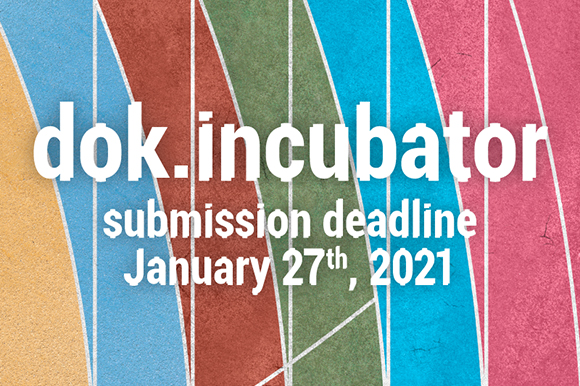 “Despite the difficult situation we were able to keep the high quality of our final films thanks to the extraordinary effort of our tutors, who were traveling into the participants' editing rooms over the whole Europe. We would like to employ a hybrid form for the beginning of 2021,” says project director Andrea Prenghyová.
“Despite the difficult situation we were able to keep the high quality of our final films thanks to the extraordinary effort of our tutors, who were traveling into the participants' editing rooms over the whole Europe. We would like to employ a hybrid form for the beginning of 2021,” says project director Andrea Prenghyová.
FNE spoke with Prenghyová about the 2021 activities of dok.incubator.
FNE: How has Covid-19 affected the dok.incubator schedule for 2021?
Due to Covid-19 all our projects are now delayed and will start later. This means, among other things, we won't have any films at IDFA and Sundance this year because we didn't have them ready in time for these festivals. However, in 2021 we would love to go back to our usual timeline.
At the end of January we have the deadline for participants. The results will be announced in early March. In April we plan to start our first workshop, if possible.
FNE: In the Covid times planning is very difficult. Do you have any alternative versions of your programme?
The preliminary plan includes two versions of the timeline. One of them is hybrid with both online and personal meetings with the tutors. The second and more optimistic version is that we will be able to do residential sessions like we used to in the past years. So far we plan our main activities for the end of April, June, and September.
FNE: Can you name some of the tutors who will work with the participants this year?
We have Joëlle Alexis from Israel, who worked on several films which premiered at Sundance. Thomas Krag from Denmark has been collaborating with the Danish Film Institute and is the head of editing at the Danish School. Audrey Maurion from France has contributed to a lot of quite well known films like A Specialist and Slavery Routes, and directed Farewell Peasant. Chris Wright from Germany will have a film in the Sundance competition this year. And of course, we have such famous faces as Freddy Neumann for marketing and Christine Le Goff for the productional side of things.
FNE: How do you choose tutors?
We always prefer to pick our tutors from various European territories, because we think it's extremely creative to get different points of view on the films. And this way we do pretty much everything: as a very complex workshop to which we bring together professionals who wouldn't normally connect – for example editors with marketing people, distributors, sales agents, etc. This mixture of professions and the resulting creative discussion really helps people to get another perspective on their work.
FNE: Can you elaborate on the selection process? What criteria do you use to pick the projects you will work with?
Our selection process has two rounds. In the first round each of the registered films is watched by two people. At this stage primarily the quality of the material is considered, rather than the intention, given the fact we are a rough-cut workshop. In the second round, twenty-five of the most promising films are assessed by five other people. This time we bring sales agents, editing tutors, production tutors to watch the films and we evaluate not only the quality of the material, but also the topic, since we want to work on important films, reflecting what is going on in the society.
We take into account members of the crew, mainly the editor, and we go through previous work of the editor and director as well. Together we discuss the potential of the project and the way we can bring out the best of it. In case we can't be of any help to a project, we don't accept it.
FNE: What is the structure of the dok.incubator workshops?
We have a very special methodology compared to other workshops. We are not a theoretical training programme; the participants learn through work on their own material. We get involved not only with the producer, but with the whole team, which includes the director, producer, editor, sometimes even PR or a marketing person. At each workshop we screen the material, we discuss it in a large plenary session and then we make progress with the team on an individual basis.
The team splits and its members are all busy with their respective sessions. Of course, the whole team has to meet at least once a day to discuss what decisions they need to make and which way they want to go. The workshop is quite intense, but at the same time, it is a very inspiring place, which brings a lot of creativity to the projects.
FNE: What was the largest success of the dok.incubator films in 2020?
Despite the Covid situation, 2020 was a really great year for us. We had three films at Sundance, two of which won awards: Acasa, My Home for best cinematography and Iryna Tsilyk for best director of The Earth is Blue as an Orange. Acasa, My Home was also nominated for an EFA Award and The Earth is Blue as an Orange was screened at Berlinale. Seven films premiered at CPH:DOX, three films at Hot Docs and another three at Visions du Réel. It was an amazing run!



















